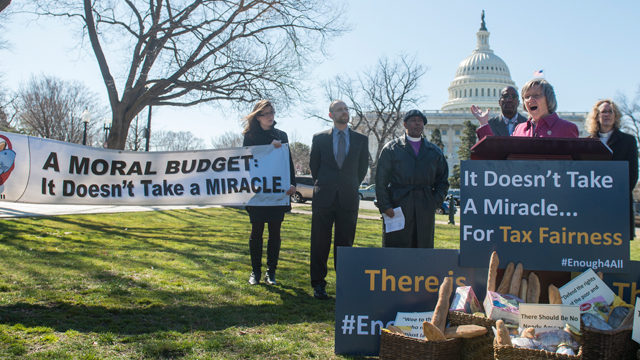This post first appeared at TalkPoverty.

CQ Roll Call) (CQ Roll Call via AP Images)” width=”640″ height=”360″ class=”size-full wp-image-118915″ />
Sister Simone Campbell, who led the “Nuns on the Bus” tour for social justice last summer, speaks during the “Loaves and Fishes” news conference in Upper Senate Park to highlight the need for “moral and political courage in federal budget negotiations” in 2013. (Photo By Bill Clark/CQ Roll Call via AP Images)It is now almost a cliché when religious leaders state that the federal budget is a test of our nation’s moral values because it reflects our fiscal priorities. We have been saying that individually and collectively for decades.
How are we doing in this measure of morality?
A key moral issue of our times is extreme wealth inequality in the US, along with structures that block people from accessing what they need to rise out of poverty, such as a lack of affordable housing or access to healthcare. Like Pope Francis, we at NETWORK believe there is an urgent need to address these twin injustices. The federal budget is one of our country’s most important tools to make that happen.
However, most major budget proposals coming from Capitol Hill do little or nothing to address inequality – or, even worse, they exacerbate it. This is not a partisan view. In fact, powerful and wealthy voices motivated by self-interest have seen their influence greatly increase across party lines in recent years. Their voices drown out those of millions of people with less clout.
In 2011, appalled by years of skewed budget priorities, my organization joined a coalition of 37 faith groups representing Jewish, Muslim and Christian traditions. Our goal was to formulate a new budget plan rooted in our faiths’ teachings about compassion and justice.
Our work resulted in a document we call “Faithful Budget,” which combines bedrock values drawn from our sacred texts and shared experiences with real examples of how our federal budget can address economic injustice. We later updated the document to reflect our new economic reality.
Our principles for a faithful budget are these:
- Economic opportunity for all: The economy is failing to create enough jobs with sustaining wages. We need to invest in education and job creation, along with policies that help families to build assets.
- A genuinely progressive tax system: Our tax system now frequently places more of a tax burden – as a percentage of income – on the middle class than it does on the wealthiest among us. We need to prioritize raising sufficient revenue for vital programs over cutting taxes for those with the most wealth.
- Prioritizing true human security over Pentagon spending: Our nation now allocates well over half of its discretionary budget to the Pentagon. We need to cut Pentagon spending while we fully fund healthcare and other sources of individual, family and community wellbeing.
- Addressing human needs in the US and around the world: Far too many people live with hunger, unemployment and untreated or avoidable illnesses. We need to fully fund programs like SNAP (food stamps) and Medicaid.
- Care for the economic wellbeing of future generations and for all creation: We now do far too little to ensure that future generations will thrive in a sustainable world. We need to fund programs that help children to be better prepared for the future and move us to a healthier environment.
- Health care access for all: We must build on recent successes in increasing the percentage of people with health insurance. Current efforts to dismantle the Affordable Care Act through defunding and other means should be thwarted, and health care access should be expanded to include all.
- Recognition of a robust role for government in fostering economic justice: Government must focus on the well-being of all, not just those who are rich and powerful. We need more effective budget priorities designed to overcome inequality.
Catholic sisters, and all who serve people at the economic margins, experience on a daily basis how poverty and inequality unravel the social fabric of our entire nation. We can’t afford to let that continue.
On April 28, members of our Faithful Budget community were on Capitol Hill to brief congressional staff about our vision. We hope and pray that next year’s budget will better reflect our shared values of fairness and compassion. Thousands of our members intend to convince Congress it should act to ensure that happens. This is the right thing to do to pass the moral test of our time.
The views expressed in this post are the author’s alone, and presented here to offer a variety of perspectives to our readers.


